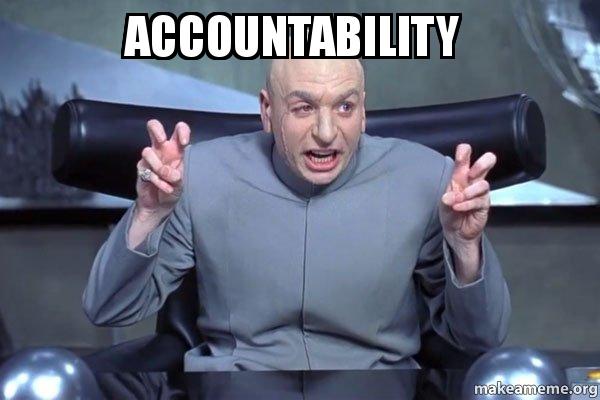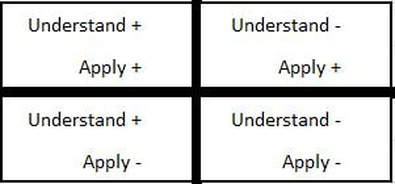 Accountability is more than surrounding yourself with "yes men" Accountability is more than surrounding yourself with "yes men" Part two in a series on the topic of accountability, to read Part one click HERE. How many times do you hear, “Someone needs to hold so-and-so accountable for their actions”? And the peanut gallery nods their head vehemently in agreement, “That’s right, it’s about time that so-and-so was held accountable for such-and-such.” People in a position of leadership are often fond of the peanut gallery, those that cheer them on in the execution of the leadership duties. Funny enough, the history of the peanut gallery comes from days past and referred to the cheapest tickets where the rowdiest vaudeville consumers heckled the performers. Needless to say, those in a position of leadership who only seek “yes men” to affirm their ever action seek the praise of those who are not fueled by vision or invested in progress. In our prior article, Accountability? What's that? v.1 we introduced the song "Responsibility" by MxPx as the back drop to our conversation on the topic of personal and organizational accountability. The chorus of this indie punk rock song goes like this: Responsibility? What's that? Responsibility? Not quite yet. Responsibility? What's that? I don't want to think about it; we'd be better off without it. These articles from IZ Ventures serve as the verses to the chorus which we hope will provide a sonic cue as well as a motivational soundtrack to your pursuit of creating a culture of personal and organizational accountability. Accountability? Not quite yet. Consistency means doing what you have said regardless of the obstacles or the opposition. How many positive efforts die before they ever grow legs, before they are ever put in motion and how many more die the minute there is opposition. Those in a position of leadership are tasked with the responsibility to identify and implement programs, systems and changes that will grow their team. The best ideas don’t have to be complex or innovative to move a vision forward but they will have to be combined with commitment and endurance. Changes, especially those that net long term results, require energy and resources, they will cost money, time and will have to adapt to the path that unfolds but they should not die because someone decides they aren’t comfortable with change or don’t want to put the work in to see something through. The peanut gallery cheers as long as they are not challenged, they heckle like petulant children when they don’t like something but they are not of the character to get in the trenches and move a team forward so their opinions should not be given value by those who are leading an organization from vision to action. When those in a position of leadership allow obstacles to deter them or fold under the pressure of internal opposition to change they send a clear message that their resolve isn’t set to defend their values. “A person who refuses to say ‘the buck stops here’ really isn’t a leader at all,” notes Dr. Travis Bradberry, author of Emotional Intelligence 2.0, “Being a leader requires being confident enough in your own decisions and those of your team to own them when they fail.” Leaders must be open to input where those engaged in the mission are sharing insights of repute but complaining by those who want to defend the status quo should be quelled. A quick test to determine whether someone is complaining or providing constructive criticism is to simply ask, “Before you finish your statement: 1) if you are bringing me a problem are you also bringing me a solution, and 2) if you believe you have a solution are you willing to put your skin in the game to see it through?” If the answer to either of these questions is NO then it is a complaint and the person in a position of leadership (PIAPOL) should move on, quickly. No further discussion. As a counter point to this line of thinking, there was a thoughtful discussion initiated by Georgia Institute of Technology Graduate Research Assistant Robert Walters taking a look at the sentiment of, "Dont' bring me problems, bring me solutions," as a bad leadership characteristic (see the article and discussion HERE). Mr. Walters brings up a good point with regards to eliminating input/discussion from those who may need some assistance from those who are supposed to be providing it. Those in a position of leadership need to be wise in reading the needs of their team - 1) is this an instance where someone needs to find a solution or 2) is this a situation where someone is in need of assistance to make progress in their development? Accountability can create conflict as a strong culture will require everyone on the team, top to bottom and bottom to top, to work towards the same goals. As discussed in our article on conflict and disciplining according to values, people fall into four quadrants with regards to intersection of understanding and application:  Four quadrants understanding & application Four quadrants understanding & application An organization must be clear about their vision, consistent in their execution and hold all team members accountable, the benefits of a culture of accountability as previously referenced is that the team by it's actions will hold each other to the standards they share. We want team members to understand and apply these values, if they don't we have to ask whether we have communicated and trained clearly or if there is a need to discipline (read more HERE). There is a progression in accountability, it does not appear out of thin air or materialize on its own. Accountability for a person and an organization comes from consistency in executing clearly established values. Where clarity is lacking there is no foundation for consistency. Where consistency is lacking there is no culture of accountability. Start with clarity of vision and values, then develop consistency in execution of those core principles and accountability will build as you uphold those standards. In our last post we included the music video for MxPx Responsibility, for those who may not be fans of punk rock below is a video of lead singer Mike Herrera playing the song acoustically. Perhaps you will enjoy this song as much as we do and it may provide a sensory cue to motivate you towards your goals of building a culture of accountability.
0 Comments
Leave a Reply. |
AuthorThoughts on personal and professional development. Jon Isaacson, The Intentional Restorer, is a contractor, author, and host of The DYOJO Podcast. The goal of The DYOJO is to help growth-minded restoration professionals shorten their DANG learning curve for personal and professional development. You can watch The DYOJO Podcast on YouTube on Thursdays or listen on your favorite podcast platform.
Archives
March 2023
Categories
All
<script type="text/javascript" src="//downloads.mailchimp.com/js/signup-forms/popup/unique-methods/embed.js" data-dojo-config="usePlainJson: true, isDebug: false"></script><script type="text/javascript">window.dojoRequire(["mojo/signup-forms/Loader"], function(L) { L.start({"baseUrl":"mc.us5.list-manage.com","uuid":"b9016446bd3c6a9f0bd835d4e","lid":"83282ffb9e","uniqueMethods":true}) })</script>
|
Jon Isaacson |
Connect. Collaborate. Conquer.
© COPYRIGHT 2015. ALL RIGHTS RESERVED.
|



 RSS Feed
RSS Feed